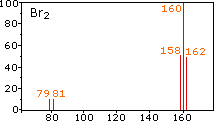What are the advantages and disadvantages of mass spectroscopy?
1 Answer
See below.
Explanation:
Some noteworthy advantages:
Mass spectrometry (MS) gives information about the molecular weight of your compound and, when performed in conjunction with a combustion analysis, the relative percentages of carbon, hydrogen, and oxygen present. This is quite useful in determining a molecular formula for the compound you are attempting to identify.
Additionally, MS can tell you if the compound contains certain elements such as bromine and chlorine, based on the abundance of their isotopes. The presence of these halogens is easily detected by noticing the intensity ratios of ions differing by two atomic mass units. For example, if bromine were present in your compound, you would see two distinct peaks at the masses of the two (stable) isotopes of bromine, Br-79 and Br-81. For chlorine, this could be Cl-35 and Cl-37.
Mass spec. can be very useful when attempting to discern the identity of an unknown compound when used in conjunction with other identification techniques such as carbon and proton NMR and IR spectroscopy. It is, of course, not so useful if you are trying to distinguish between compounds which have the same molecular formula.
Some other disadvantages include that you would not be able to distinguish between isomers of a compound having the same charge-to-mass (m/z) ratio. Separating enantiomers usually requires something such as a chiral column.
This is by no means a comprehensive list!
A mass spectrum containing the isotopes of bromine:


